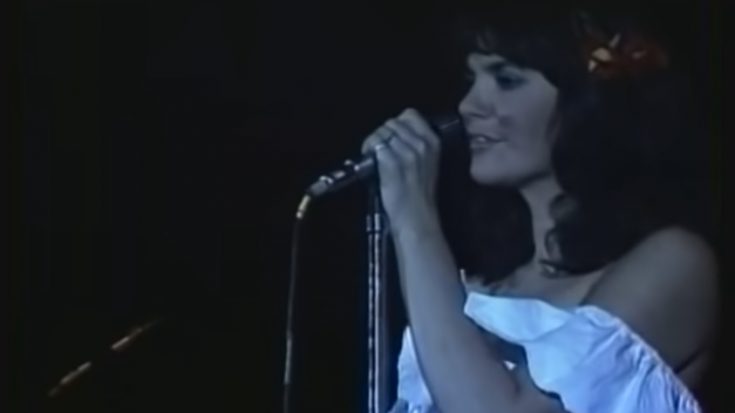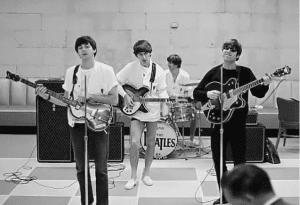Overlooked Songs From Each Linda Ronstadt Album

Linda Ronstadt live in 1976 - retrofan01 / Youtube
Linda Ronstadt. Just the mention of the name alone brings in a rush of sonic images that capture the many facets of her impressive vocal skill. While she mostly did covers of songs, her ability to make them her own was enough to garner the attention of listeners and critics alike. Ronstadt’s pipes and understanding of what she sings sets her apart from just being another cover artist. With that, here are some underrated cuts from her acclaimed albums throughout the years.
“I’ll Be Your Baby Tonight” – Hand Sown…Home Grown (1969)
Ronstadt borrows from no other than the iconic Bob Dylan to deliver a dreamy rendition of “I’ll Be Your Baby Tonight”. She injects the right amount of charm into the song for that lighthearted thump without making it dull.
“Long Long Time” – Silk Purse (1970)
Starting off with a soft coo, Ronstadt immediately turns up the emotion as she goes pumps up the vocals for the verse while alternating intensity to build texture. The strings and bass progressions also add to the feeling of longing as they tug at each other with subtle note changes.
“I Ain’t Always Been Faithful” – Linda Ronstadt (1972)
Ronstadt goes country on her eponymous third album with cuts like “I Ain’t Always Been Faithful”. The sleepy melancholic progression is enhanced by her sweet vocals spiraling it.
“Don’t Cry Now” – Don’t Cry Now (1973)
J.D. Souther penned the song for Ronstadt, “Don’t Cry Now”, is a testament to how she breathes life into songs written by others. She plows through the heartwrenching message of the song with such clarity and restraint worthy of acclaim.
“It Doesn’t Matter Anymore” – Heart Like A Wheel (1974)
Ronstadt proves she’s the master of channeling emotions with cuts like “It Doesn’t Matter Anymore”. Another country-tinged track from a Paul Anka original, she gives it a laidback take that makes giving up sound like a sane option.
“You Tell Me That I’m Falling Down” – Prisoner In Disguise (1975)
“You Tell Me That I’m Falling Down” from 1975’s Prisoner in Disguise is a unique number with its placid arrangement coupled with Ronstadt’s calm and soothing performance fitting the mood. James Taylor also helps on the song’s acoustic guitar parts.
“Lose Again” – Hasten Down The Wind (1976)
It’s easy to get lost in Linda Ronstadt’s voice especially on songs like “Lose Again.” This emotionally-charged number from Karla Bonoff opens the album with such force that the momentum carries over the entirety of the record.
“Carmelita” – Simple Dreams (1977)
Ronstadt carries this Warren Zevon tune with such grace and poise but makes sure that it doesn’t lose its feel in the course of her performance. “Carmelita” and its paced cadence gives it a unique charm to complement the other tracks on Simple Dreams.
“Alison” – Living in the USA (1978)
Living in the USA had Ronstadt doing covers from renowned artists, which included Elvis Costello and his song, “Alison”. While it was a rich reimagination of Costello’s song, it earned negative comments from him and saw the royalties as the only good thing coming from the recording.
“Look Out For My Love” – Mad Love (1980)
Ronstadt took a risk with 1980’s Mad Love as the growing number of punk and New wave enthusiasts were threatening to cut pop music sales. It’s a good thing that Neil Young’s “Look Out For My Love” and its contemporary arrangement paid off to this new crowd.
“Easy for You To Say” – Get Closer (1982)
“Easy For You To Say” is pretty reminiscent of most ’80s ballads but Ronstadt’s play on dynamics takes the number to another level. From emboldened delivery that shows defiance to coos of longing and resignment, the song is definitely an underrated gem to consider.
“I Don’t Stand A Ghost of a Chance with You” – What’s New (1983)
“I Don’t Stand a Ghost of a Chance with You” was a bold move from Ronstadt, who in the midst of the disco era, revisited some of the classics for her 1983 album What’s New. It was well-received thanks to her delivery, updating the classic into a fitting arrangement and performance for the decade.
https://www.youtube.com/watch?v=wxyg6uS91Dw&ab_channel=JazzysClassicJazz
“When Your Lover Has Gone” – Lush Life (1984)
Ronstadt going jazz for the mid-eighties once again cemented her reputation as one of the most versatile acts of the industry. “When Your Lover Has Gone” is one such example, with a slow and dreamy arrangement for her vocals to lay work on.
“Am I Blue?” – For Sentimental Reasons (1986)
Her work with renowned jazz bandleader Nelson Riddle was sealed with For Sentimental Reasons, with the song “Am I Blue?” painting a more playful landscape than her other jazz numbers. Excellent use of sax accents fills in for her vocals until she takes the spotlight back with a sweet crooning style.
“Y Andale” – Canciones de mi Padre (1987)
Ronstadt proved that she didn’t need to sing in the English language to succeed in her craft, as the commercial implications of Canciones de mi Padre upon release made Spanish songs more accessible to the masses. “Y Andale” and its carefree delivery makes it an easy listen for any fan.
“I Need You” – Cry Like a Rainstorm, Howl Like the Wind (1989)
“I Need You” has a Gospel-like influence where Ronstadt is assisted by Aaron Neville in one of their four duets on her 1989 album, Cry Like a Rainstorm, Howl Like The Wind. One of her lighter tracks with a pop arrangement, “I Need You” provides a counterbalance for her heftier numbers.
“Mi Ranchito” – Mas Canciones (1991)
Having already done numerous Spanish and Mexican numbers in the past, Linda Ronstadt’s “Mi Ranchito” from 1991’s Mas Canciones is her at her most comfortable. She is able to express and go toe to toe with the lush instrumentation and arrangement typical of these songs.
“Entre Abismos” – Frenesi (1992)
Another non-English record came with 1992’s Frenesi, with the song “Entre Abismos”, a fun-laced number that gains energy halfway through its runtime.
“Anyone Who Had A Heart” – Winter Light (1993)
Ronstadt goes back to her pop leanings with 1993’s Winter Light, with the song “Anyone Who Had A Heart” being an overlooked cut that is reminiscent of its contemporary love songs. The shift in feel and emotion in the song can be attributed to the phrasing and backing vocals dictated by Ronstadt’s vocal drive.
“The Blue Train” – Feels Like Home (1995)
“The Blue Train” doesn’t sport the usual Linda Ronstadt power in terms of vocals but it just shows how much her vocal control and decision made the song hold much value. Even if she doesn’t exist a lot of effort into the recording, the song has a weightless and easygoing feel that is unmistakably Ronstadt to the core.






























